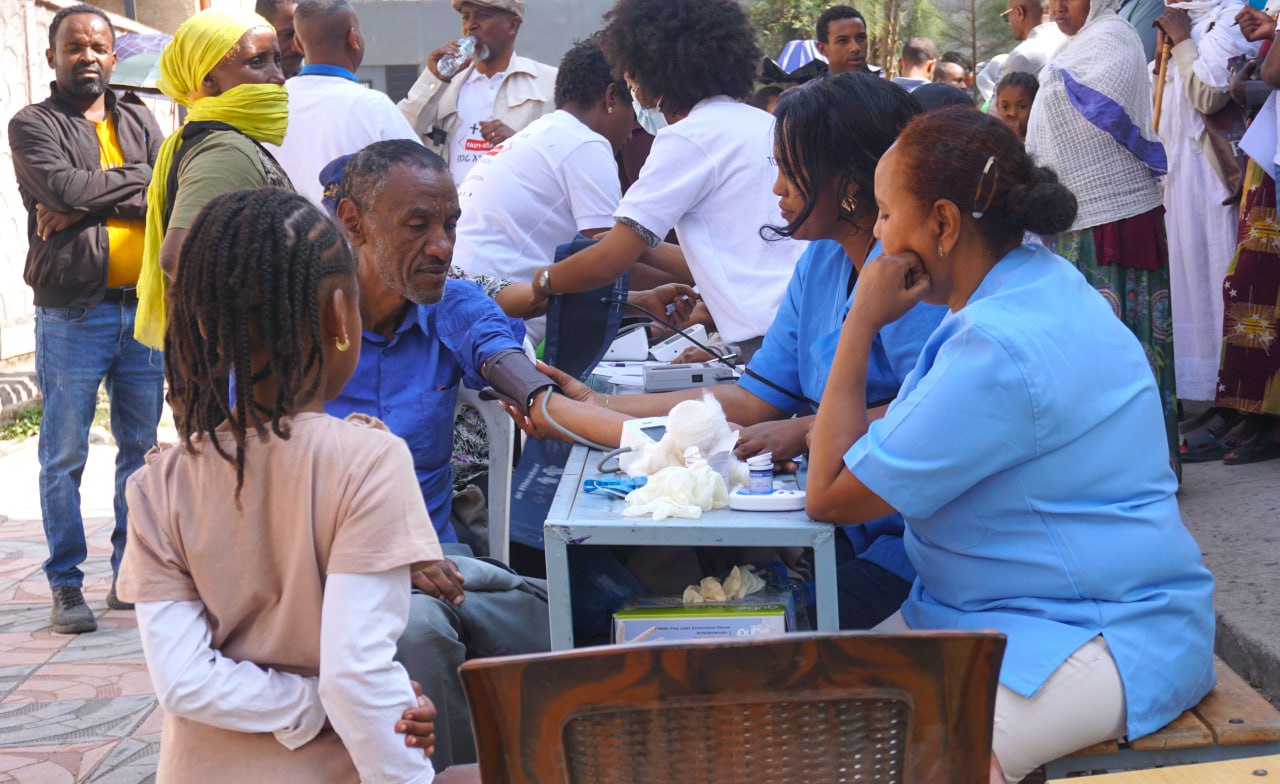Time to Lead: Frontline Women Transforming NCD Care in Ethiopia
19 September 2025

When 35-year-old Peter, a community schoolteacher in Ethiopia, suddenly developed symptoms of diabetes, he was initially misdiagnosed and given the wrong medication. As his health deteriorated, a trained chronic disease nurse in one of our NCD projects recognised the signs of type 1 diabetes and referred him urgently to Gondar Teaching Hospital.
Her quick action and accurate diagnosis saved his life, offering him a second chance to pursue his dreams.
Stories like Peter’s show why this year’s Global Week for Action on NCDs and its theme, “Time to Lead”, matter so deeply.
Tackling noncommunicable diseases (NCDs) requires bold, inclusive leadership not only at the national level, but also in neighbourhoods, schools, and households.
In Ethiopia, we have partnered with the Ministry of Health and the Addis Ababa City Health Bureau to tackle the growing burden of hypertension and diabetes. Through the Fraxinus-funded project, we are strengthening prevention and early detection of non-communicable diseases by training and equipping Health Extension Workers and introducing digital tools to improve community health services. But leadership is not only seen at national level. Here female health workers on the frontline are stepping up every day to lead this transformation.
Empowering the frontline workforce
Health Extension Workers (HEWs), most of them women, are trusted figures in their communities. Through the project, they have been trained and equipped to identify risks, raise awareness, and support the prevention and early detection of hypertension and diabetes. With a stronger skillset, they are transforming local health systems from the ground up.
NCD awareness at home
One initiative that has resonated strongly with communities is an intensive community engagement campaign. HEWs visited households to:
- Raise awareness.
- Offer screenings.
- Link those found at risk to nearby clinics for timely care and follow-up.
Face-to-face conversations, supported by simple visual aids, built trust and helped people understand risk factors. Misconceptions were addressed directly, and families were encouraged to adopt healthier habits, such as getting more physical activity and checking blood pressure regularly. Later, community events reinforced these messages with interactive education.
By equipping HEWs to assess, inform, and refer individuals – and by ensuring referrals were followed up at health facilities – the project laid the foundation for long-term, sustainable care.
Storybooks inspiring children to be health champions
To make prevention a shared responsibility, the project also reached into classrooms. With support from our technical advisers at Southampton University, Colourful storybooks for children were introduced in schools to spark conversations about healthy living in fun, age-appropriate ways.
These stories encouraged children to become “health champions,” carrying simple but powerful messages about diet, exercise, and blood pressure checks back into their homes.
Teachers noted that children were excited to retell the stories to siblings and parents, creating a ripple effect of awareness far beyond the classroom. By embedding NCD education into playful storytelling, the project has planted seeds of healthier habits into the next generation.
Digital tools for lasting impact
Another innovation of the Fraxinus project was equipping HEWs with hand-held computers so they could access digital learning resources. With these tablets, HEWs could refresh their knowledge on NCDs, record household screenings more efficiently, and share accurate information quickly with their communities.
At the same time, the tablets improved data collection and reporting, giving decision-makers stronger evidence to shape policy and allocate resources where they are needed most.
Looking ahead
The Fraxinus project demonstrates that tackling NCDs is not just about treatment – it is about prevention, empowerment, and local leadership.
By focusing on women at the frontline, harnessing digital innovation, mobilising schools and communities, and even using children’s storybooks to spread knowledge, we are laying the foundation for healthier futures.
As the Global Week for Action on NCDs reminds us: It’s Time to Lead. Ethiopia’s story proves what’s possible when communities themselves are given the tools to take charge.
Take Action With Us
You can help expand access to NCD care and strengthen rural health centres in Ethiopia. Every contribution makes a difference.
Support our work on Global Giving: Rural Health Centres in Ethiopia


0 Comments
Leave a comment
Your email address will not be published.